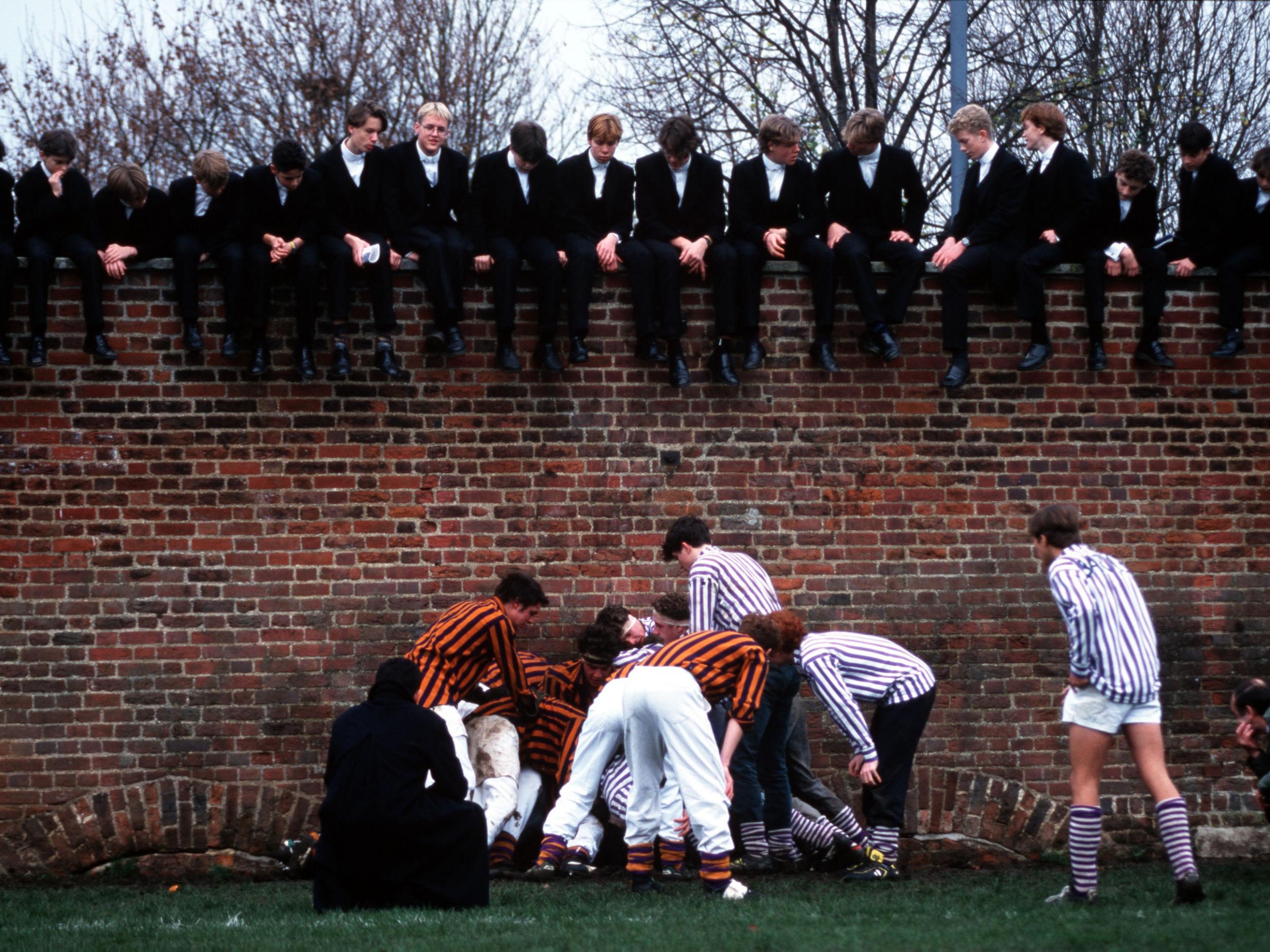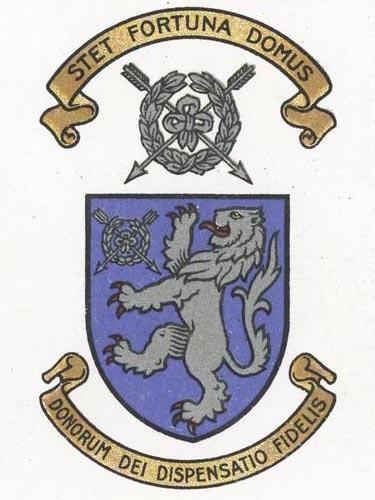Can a school motto really inspire pupils when times get tough?
Godfrey Holmes is surprised to find that ‘challenge’ is not emblazoned on every alternate badge

Your support helps us to tell the story
From reproductive rights to climate change to Big Tech, The Independent is on the ground when the story is developing. Whether it's investigating the financials of Elon Musk's pro-Trump PAC or producing our latest documentary, 'The A Word', which shines a light on the American women fighting for reproductive rights, we know how important it is to parse out the facts from the messaging.
At such a critical moment in US history, we need reporters on the ground. Your donation allows us to keep sending journalists to speak to both sides of the story.
The Independent is trusted by Americans across the entire political spectrum. And unlike many other quality news outlets, we choose not to lock Americans out of our reporting and analysis with paywalls. We believe quality journalism should be available to everyone, paid for by those who can afford it.
Your support makes all the difference.I walk with a new headteacher into the foyer of the upper school’s sixth-form annexe where she has just been appointed. The prospectus sticking out of her Leatherex briefcase is already well-thumbed. And on its laminate cover – also etched into the assembly hall’s doors – is that institution’s motto or aspiration.
Mottoes have a very interesting history. The two secondary schools I went to – neither institution especially self-important – had, upon their 1950s’ foundation, chosen Latin mottoes: “Honi soit qui mal y pense” (spurned be the one who evil thinks); and “Mens sana in corpore sano” (a healthy mind in a healthy body), respectively. So I knew I’d have to start any study of slogans with heraldry.
When landed families built their castles, stately homes or manors, they asked the king’s permission to take up, or retain, arms. But their serfs or yeomen could not necessarily read. What better than to devise a shield of four or five colourful symbols embellished with simple text or a strapline? Then to carry that same shield into battle? A bit like hoisting a flag or blowing a trumpet. Impress friend and enemy alike. Show off your wealth and lineage.
Whole centuries later, an unassuming inner-city comprehensive discovers that the 4-by-5in breast pockets stitched onto its newly ordered maroon blazers are exactly the right size to take a shield and an end-of-year target. Very soon, after commencement of autumn term, everybody is singing from the same hymn sheet. Literally. Obviously, the governors’ mission statement of 222 very solemn words is a little difficult to print on each purple football strip. Therefore brevity has to take pride of place.

In order to analyse several dozen school mottoes, and not get into a quagmire, I set myself a few simple rules. My bundle of age 11+ establishments had to span single-sex and coeducation, public and private, England and Wales, large and small, rural and urban, north and south, Roman Catholic and Church of England, rich and poor. Excluded, by definition, were a minority of schools which have chosen not to extol their virtues from a great height. Perhaps the local authority is nervous of anything so elite, so pretentious, as a motto.
That noted, I was impressed by just how many downtown, marginal, or struggling schools revealed heart-warming self-belief and resilience. Each principal, each staffroom, each school council was determined to serve its surrounding community with commitment and dedication. Their colourful websites – usually open for anybody to read – were beautifully constructed, laid out, and illustrated. I witnessed therein thousands of wholesome, contented, even glowing, teenagers – whatever the turmoil, whatever the uncertainty back home. Clearly, their schools were their anchors: places where socialising, romance and adventure, stood right there alongside scholarship.
Predictably, a majority of the independents, also former direct grants, preferred a Latin motto, helpfully supplying a rough translation for newcomers. Eton College, for instance, had unofficially retained “Floreat Etona; Esto perpetua” (may Eton flourish and may it last forever); whilst Harrow acknowledged “Donorum Dei Dispensatio” (faithful dispensation of the gifts of God). The Quaker Mount School of York looked for “Fidelis in Parvo” (faithfulness in small things), Merchant Taylors’, Crosby, developing the same theme with “Concordia Parvae Res Crescunt” (small things grow in harmony). With commendable concision, Manchester Grammar School dared to be wise: “Sapere Aude”, while Roedean honoured the worthy: “Honneur aulx Dignes”.
Yet none of these crests deterred two very modern state schools from opting for “Cor ad Cor Loquitur” (heart speaks to heart); or “Murus Aeneus Conscientia Sana” (a sound conscience is a wall of brass). Occasionally, there was a direct quotation from scripture: Marlborough’s “Deus Dat Incrementum” translated as “God gives the increase”; or a slogan in Welsh: “Glewa’t Grefft Gloynsa’r Graen” (the better prepared, the stronger).

Back on the title page of a school’s report books – plainer badge, fewer italics – very few establishments choose only two bold words in order to sum up their aspirations. Far more institutions of learning choose three words. Here are a few of the twos: “Great Expectations”, “Bright Futures”, “Succeeding Together”, “Believe, Aspire”, “Inspiring Understanding”, “Maximising Potential”, “Right Prevails” and “Achieving Excellence”.
In rhetoric, the number “three” is of great importance. It is often said we hear nine pieces of information, pay attention to three, remember one! Also three possibilities don’t sound as narrow, as abrupt, as two. Here are a tiny few of the omnipresent threes: “Passport for Life”, “Let Right Prevail!”, “Integrity, Creativity, Respect” and “Praise God Always!” My favourite in this category is: “THIS GIRL CAN!”
Four-word mottoes are relatively rare: “Highest Standards for Everyone”, “Believe You Can Achieve!”, “Working Together, Achieving More” and “Inspiring People, Achieving Excellence”. And already we are seeing that a certain clutch of virtues are heavily over-represented – however short or long the eventual motto or mission statement. I was absolutely sure, when starting out, that that “weasel word”, challenge, would be emblazoned on every alternate badge. Mercifully, that proved not to be the case.

Five separate and distinct concepts are extremely hard to reel out. That did not deter one community college trying “Honesty-Pride-Respect-Aspiration-Resilience”. Moreover, and imaginatively, that same college arranged these words in a circle, so that any child, any parent, could begin wherever they wished.
Go much longer than five words and you are presented with a mini-sermon: still by no means without influence or impact: “Contemporary Education rooted in Gospel Values”, “Feeling Proud & Confident about our Learning”, “Well-founded Tradition of Teaching & Learning”, “Ambitious for Excellence in All we Do”. My own ideal in this category is the millennial: “Grasping the Opportunities, and Facing the Challenges, of the 21st Century.” No panic concerning stacks of redundant notepaper there!
So would schools suffer if they had never acquired, inherited, borrowed, or adopted all these slogans? Probably they would. When times get tough, when Ofsted inspectors are on the prowl, everyone needs a common goal. And as long as that goal is not silly: “Woodmarsh: A Nuclear-Free Zone” or “The Grange School for Boys: Always Polite”, there is considerable merit in a shared identity, an instantly recognisable logo.
Just as some high masters mimicked earls, whereupon some comprehensives mimicked the ivy-clad quadrangles of those same high masters, we are now in the position where almost every captain of industry, every hospital trust chief executive, every priest or parson, and every charity is mimicking whichever comprehensive has come up with the crispest, finest, or most inventive, mission statement.
“Stet Fortuna Domus”: let the fortune of this – and every other – house stand.
Join our commenting forum
Join thought-provoking conversations, follow other Independent readers and see their replies
Comments